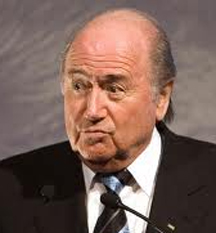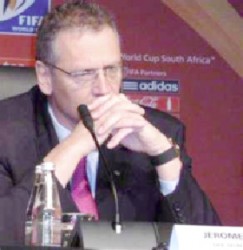BERNE, (Reuters) – Swiss prosecutors looking into corruption at global soccer body FIFA have identified 53 suspicious bank transactions, the attorney general said yesterday, stressing that the investigation may take time.
Michael Lauber told journalists he would not rule out interviewing FIFA President Sepp Blatter and General Secretary Jerome Valcke, although Switzerland had so far targetted no individuals in the scandal that has rocked international soccer.
Switzerland, where FIFA is based, announced its criminal investigation and seized computers at FIFA headquarters last month on the same day that the United States shook the sport with the announcement of indictments of 14 soccer officials and businessmen as part of a separate probe into corruption.

“We are faced with a complex investigation with many international implications,” Lauber said in his first public comments since his office obtained the computer data last month.
“The world of football needs to be patient. By its nature, this investigation will take more than the legendary 90 minutes,” he said, referring to the length of a soccer match.
FIFA’s ethics committee confirmed it was conducting its own investigation into individuals suspected of breaking the rules in relation to bidding for the right to host the 2018 and 2022 World Cups, which were granted to Russia and Qatar respectively.
It said it was prepared to investigate more suspects and take on extra staff if needed.
Also yesterday, Switzerland’s third largest listed bank, Julius Baer, said it had launched an internal investigation in connection with FIFA. It said it was cooperating with the authorities and did not say when its own probe had begun.
Swiss private banks have been buffeted by a storm of scrutiny and regulation in the past five years, largely linked to accusations of helping rich American and European clients avoid tax by stashing money in secret accounts in the past.
The attorney general was clear that Blatter and Valcke could be among those summoned for questioning: “There will be formal interviews of all relevant people. By definition, this does not exclude interviewing the president of FIFA and this does not exclude interviewing the secretary general of FIFA.”
Lauber said his team had obtained evidence on 104 bank-client relationships, each of which represented several accounts. Switzerland’s Financial Intelligence Unit anti-money laundering agency had identified the 53 suspicious transactions flagged up from information supplied by banks.
Blatter was re-elected to a controversial fifth term just two days after the graft probes became public. However, he announced the following week that he would step down and a new presidential election is due between December and February.
GARCIA REPORT SCRUTINISED
Swiss authorities have said their criminal investigation specifically targets the decisions to stage the 2018 and 2022 World Cups. Both Russia and Qatar deny wrongdoing and say they are preparing to hold the tournaments as scheduled.

Asked whether the Swiss investigation could derail Russia’s plans, Lauber said that decision was not his problem.
Lauber said his work was completely independent of the ongoing U.S. cases. While Switzerland had received and fulfilled a request for legal assistance from the United States, it had not asked for any such help in return, he added.
His investigation was looking closely at material generated by Michael Garcia, an American lawyer hired by FIFA to investigate ethics violations who spent years examining the Russia and Qatar bids.
Garcia’s report has never been published and FIFA has released only a summary which exonerated the Russian and Qatari bids of serious wrongdoing.
Garcia quit saying the summary mischaracterised his report. However, it resulted in proceedings being opened against unnamed individuals which his successor Borbely said he has continued.
“The (ethics committee) is carrying out several proceedings into football officials on suspicion of breach of the FIFA Code of Ethics based on the findings of the investigation into the decision for the 2018 and 2022 World Cups,” Borbely said in a statement.
“Should new evidence come to light, the investigatory chamber will widen the group of suspects. (It) is prepared to increase its staff numbers at any time if needed.”
Lauber said the U.S. authorities had not asked for Garcia’s report.
Lauber said his office had seized nine terabytes of data. By comparison, the U.S. Library of Congress estimates on its website that its entire collection of printed works amounts to 10 terabytes. However, a single personal computer hard drive may hold several terabytes, which can be quickly filled up with material like high definition video.
He said he had no complaints about FIFA’s cooperation to date. FIFA said in a statement that the Swiss investigation was based on a complaint that it had made itself last November.
“FIFA is cooperating fully as an injured party in the actions by Swiss authorities,” it said.
“FIFA itself instigated these proceedings in November 2014 when it presented the file on the 2018/2022 FIFA World Cup bidding process to the Swiss Office of the Attorney General.”







